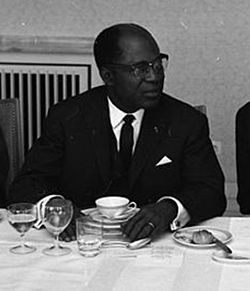Jean-Hilaire Aubame
Jean-Hilaire Aubame (born November 10, 1912 , † August 16, 1989 in Libreville ) was a politician in the central African state of Gabon .
Early years
Aubame was one of the catches that mainly live in northern Gabon and in the neighboring state of Equatorial Guinea . He was born near the capital, Libreville, and was an orphan at an early age. The clergyman Jean Obame looked after him and provided for his school education. With the help of Obame's brother, later President Léon M'ba , he got a job at customs. In 1936 he was transferred to Brazzaville .
Second World War
During the Second World War he continued to work for the French authorities. After France surrendered in June 1940, he joined de Gaulle's Free France and was sent to Libreville, loyal to the Vichy government , to enlist the support of the Fang. From February 1942 on, he was sponsored by the governor Félix Èboué and informed him about the events within the African population. In 1944 Èboué made him chairman of the administration of Poto Poto, the African city of Brazzaville. After Èboué's death in March 1944, he worked as an advisor to Governor General André Bayardelle.
Politician
Before independence
With the support of the governor, he ran for the National Assembly in Paris and was MP for Gabon since November 10, 1946. In the further elections during the IV Republic he was re-elected on June 17, 1951 and January 2, 1956, where he won in 1951 against Léon M'ba. During this time he was mostly in Paris and only rarely in Gabon, where M'ba has now expanded his power base. In Gabon, Aubame founded the Union Démocratique et Sociale Gabonaise (UDSG) and was elected for them in the Territorial Assembly of Gabon in 1952. In 1957 he was re-elected, but the strongest party was M'bas Bloc Démocratique Gabonais (BDG). Four of his party friends became ministers in the twelve-member government of the territory.
After independence
Gabon became independent on August 17, 1960 with M'ba as its first president. Aubame worked with him, became a Member of Parliament for Moyen-Ogooué and was Foreign Minister from 1961 to 1963 . In the parliamentary elections in February 1961, the BDG and UDSG ran with a joint list. In May 1962 he fell out with M'ba and left the government in 1963. Since Aubame did not want to merge his party with the M'bas, he was appointed to the Supreme Court to keep him out of politics. Aubame resigned from this office on January 10, 1964.
A short-lived military coup overthrew M'ba for a few days on February 17, 1964. Aubame, who probably had nothing to do with the coup, became head of a provisional government. M'ba came back to power with the help of French troops still stationed in the country, and Aubame was imprisoned. On April 12, 1964, the last multi-party elections until 1990 took place, in which his UDSG won 16 of the 47 seats.
Last years
He was sentenced to ten years of forced labor and another ten years in exile in August 1964. In 1972 he was amnestied by Omar Bongo , M'ba's successor in office since 1967, and went into exile in Paris . He returned to Libreville for a visit in 1981. On the occasion, President Bongo bestowed on him the more symbolic title of Special Adviser. Although he was not a supporter of the illegal opposition group Mouvement de Redressement National (MORENA), his house was bombed on December 12, 1984, from which he and his family narrowly escaped.
Web links
- Entry in the archives of the French National Assembly (French)
- Essay on the 1964 coup at ACDIS (English)
| personal data | |
|---|---|
| SURNAME | Aubame, Jean-Hilaire |
| BRIEF DESCRIPTION | Gabonese politician |
| DATE OF BIRTH | November 10, 1912 |
| DATE OF DEATH | August 16, 1989 |
| Place of death | Libreville |
